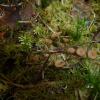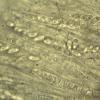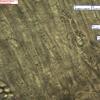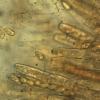
25-01-2026 23:23
Hello! I found this species that resembles Delitsc

05-02-2026 15:07
Found on a fallen needle of Pinus halepensis, diam

05-02-2026 06:43
Stefan BlaserHello everybody, Any help on this one would be mu

18-08-2025 15:07
 Lothar Krieglsteiner
Lothar Krieglsteiner
.. 20.7.25, in subarctic habital. The liverwort i

02-02-2026 21:46
Margot en Geert VullingsOn a barkless poplar branch, we found hairy discs

02-02-2026 14:55
 Andgelo Mombert
Andgelo Mombert
Bonjour,Sur thalle de Lobaria pulmonaria.Conidiome

02-02-2026 14:33
 Andgelo Mombert
Andgelo Mombert
Bonjour,Sur le thalle de Peltigera praetextata, ne

31-01-2026 10:22
 Michel Hairaud
Michel Hairaud
Bonjour, Cette hypocreale parasite en nombre les

In the area of Telemark (southern Norway), at the touristic point of the Ravensjuv, we collected a Sclerotiniaceae on dead stems of Rubus chamaemorus (at least this was the only plant that could be regarded a possible substrate in the vicinity). So - I asked ant G and so I found the paper of Holst-Jensen & Schumacher. And - what a luck - there was a species that seems to fit perfectly: the spores with the two quite large polar drops as contents that also have the right size, the habit and the substrate, the excipulum of globulosa. Everything o.k. - But: I did the IKI-reaction and obtained deeply blue pori. Holst-Jensen & Schumacher, however, describe the pori as iodine-negative.
Who knows C. latipes and also has obtained blue pori?
Regards from Lothar

never saw this interesting species or photos of it. In only know Nina's pretty photos of Rutatroemia cf. chamaemori, which has much longer curved spores like R. echinophila. But typical R. chamaemori has spores similar as yours, though longer.
I assume you checked the excipulum of globulosa? Did you measure more spores?
There is a further mismatch in the protologue: How can a species be named latipes when it could better be called filipes or the like? I guess the stipe is max. 0.5 mm wide, not 0.7-2 mm. There must be some confusion, or?
Lothar, falls du eine pdf hast dann schicke mir sie doch (hab nur eine Papierkopei). Falls du Holm & Holm 1977 fungi on Rubus chamaemorus nicht hast, den schicke ich dir gerne.
Seid ihr wohl schon wieder zurück?
Zotto

Hi Zotto,
yes, the excipulum is globulosa, the asci have croziers. I did not measure more spores by now, but can do this still with my fotos.
Den Aufsatz habe ich mir im Internet herunter geladen (Research Gate), aber das Speichern funktioniert nicht richtig (Text ist dann verzerrt und unlesbar). So kann ich Dir das leider nicht zusenden, aber Du solltest es selbst ergoogeln können.
Holm & Holm habe ich nicht - würde ich gerne haben ;-)
Yes, we returned Monday. There were not many fungi growing - it was still early spring in Scandinavia! (most common fungus was Gyromitra esculenta).
Kind regards and thanks!
Lothar




